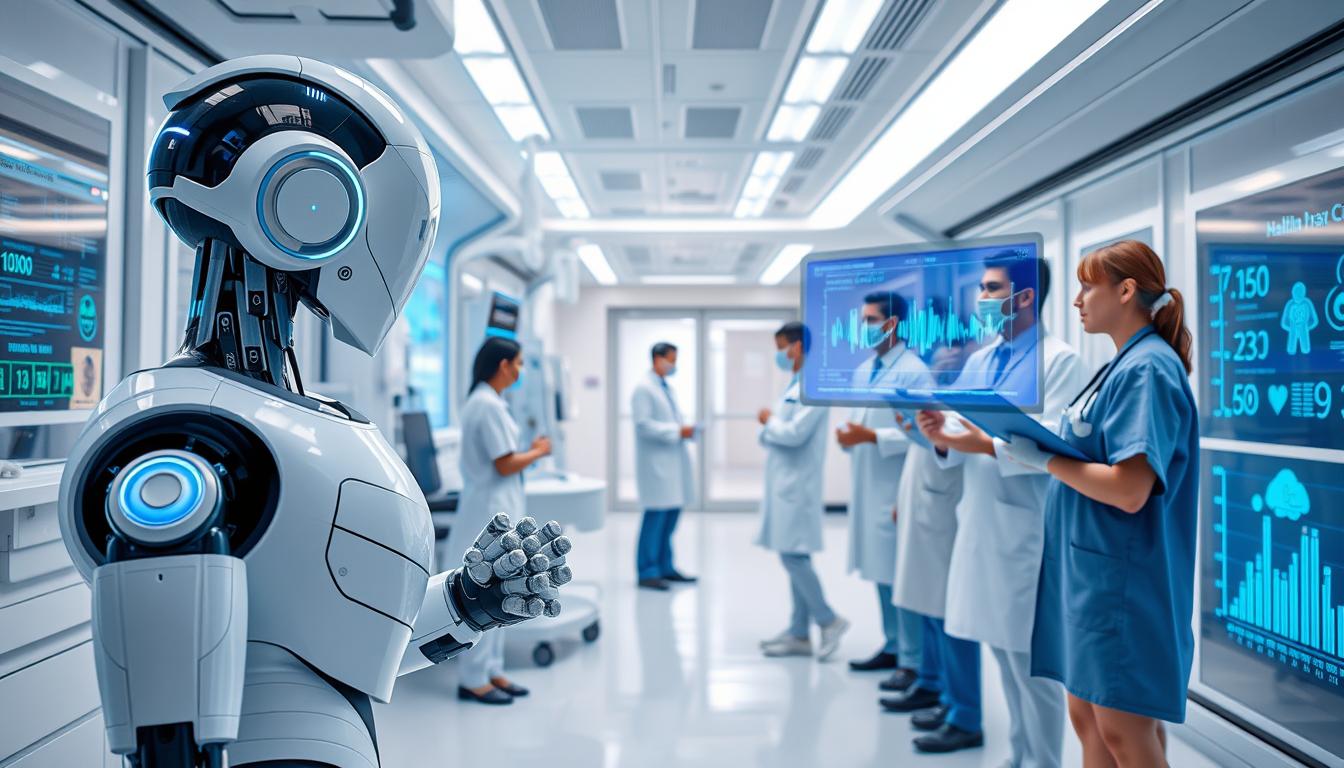Did you know the AI industry in healthcare is expected to hit $6 billion by 2021? This huge growth shows how artificial intelligence is changing patient care and medical practices. AI is making medicine more personal and improving diagnostic tools.
Healthcare is facing challenges like a shortage of workers and more patients. But AI is helping with solutions like predicting patient risks and changing how we find new drugs. It’s a key part in making healthcare better today.
To learn more, check out this insightful resource on AI in healthcare1.
Key Takeaways
- AI is projected to revolutionize healthcare with an estimated market size of $6 billion by 2021.
- Predictive analytics improve clinical decision-making, enhancing patient care quality and reducing unnecessary medical procedures.
- AI-powered platforms streamline drug discovery, significantly decreasing development times and costs.
- Integration of AI enhances imaging diagnostics, achieving 99% accuracy and vastly improved efficiency.
- AI’s predictive capabilities help identify risks such as re-admissions and heart disease in patients.
- Robotic systems have been assisting in surgeries and rehabilitation for over 30 years, showcasing long-standing benefits of AI.
Introduction to AI in Healthcare
Artificial Intelligence (AI) is changing many fields, especially healthcare. It’s important to know what AI is. AI systems can do things that humans used to do, like learn from data and solve problems.
In healthcare, AI is used in many ways. It helps with diagnosing, making treatment plans, and keeping an eye on patients.
Definition and Scope
The definition of AI is more than just making things work automatically. It has grown a lot in medical areas. AI helps doctors make better diagnoses and treatment plans. It also makes administrative tasks easier, helping patients get better care.
AI uses technologies like machine learning and natural language processing. These tools are changing how doctors and patients work together and handle data2.
Historical Context
The story of AI historical development starts in the 1950s. Back then, AI was just starting. Early systems helped doctors make decisions and were big in the 1980s.
Even with early challenges, AI kept being important for health care. Now, with better data analysis, AI can handle tough health problems. It helps doctors make quicker and more accurate decisions34.
The Impact of AI on Patient Care
Artificial Intelligence is changing patient care in big ways. It brings new ideas for personalized healthcare, better diagnosis, and smarter treatment plans. AI can look at lots of data to help doctors give treatments that fit each person’s needs. This makes health care better for everyone.
Personalized Medicine
AI is key in making medicine more personal. It looks at genes, lifestyle, and health history to make plans just for you. This makes patients happier and treatments work better, raising the bar in health care5.
Improved Diagnosis Accuracy
AI helps doctors make more accurate diagnoses by cutting down on mistakes. It can spot diseases early and help patients get the right care fast56. As AI gets better, it will make diagnoses even more precise and quick.
Enhanced Treatment Plans
AI uses big data to make treatment plans better. It guesses how well a patient will do with certain treatments and picks the best drugs. This means patients get the best care for their specific needs, leading to faster recovery and fewer side effects67.
AI-Driven Diagnostics Tools
AI-driven diagnostics tools are changing how we analyze medical data and care for patients. They use machine learning to make medical imaging and predictive analytics better. This makes processes faster and more accurate.
Machine Learning in Imaging
Machine learning in medical imaging AI helps doctors analyze tests like X-rays and MRIs. It helps find diseases accurately. Even though hospitals do 3.6 billion imaging tests a year, most data is not used8.
AI can now use this data to make better decisions. This makes diagnosis more accurate than old methods9.
Predictive Analytics in Patient Outcomes
Predictive analytics in healthcare uses past data to predict patient health. AI tools look at medical history and lab results. This helps doctors find patients at risk and prevent problems.
Studies show AI can be more accurate and efficient than traditional tools8. AI uses real-time data to help patients recover faster. This reduces hospital readmissions and improves recovery rates10.
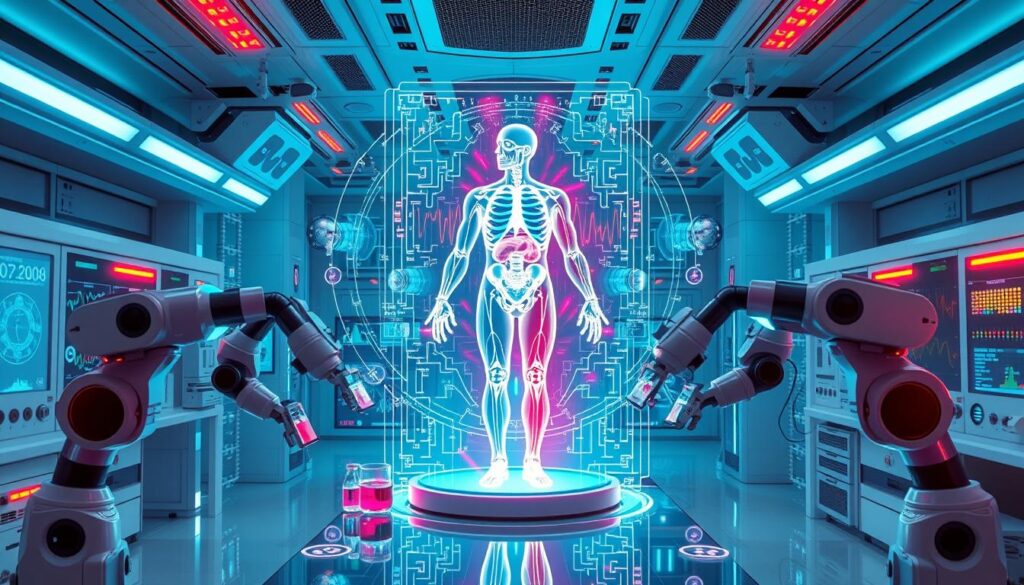
Natural Language Processing in Healthcare
Natural Language Processing (NLP) is changing healthcare. It makes managing clinical documents and talking to patients easier. This leads to better care for everyone.
Streamlining Clinical Documentation
NLP cuts down the time doctors spend on paperwork. Doctors often spend more than six hours a day on it11. With NLP, this time is greatly reduced.
It also makes documents more accurate and reduces errors11. This means doctors can make decisions faster and feel less stressed.
Enhancing Patient Communication
NLP helps with AI chatbots and virtual assistants. These tools talk to patients and answer their questions quickly. This makes patients happier and more involved in their care.
About 80% of medical data is not organized, making NLP very important11. It also lets doctors understand how patients feel, leading to better care12.
Robotic Surgery and AI
Robotic surgery and AI technology are changing medical practices. They make surgeries better and safer for everyone. This is good news for patients and doctors alike.
Benefits of Robotic-Assisted Procedures
Robotic surgeries have many advantages over old methods. They are more precise and less invasive. This means better results for patients.
- Improved Surgical Accuracy: Robotic systems give surgeons better control.
- Reduced Recovery Times: Patients get out of the hospital faster.
- Decreased Risk of Complications: Robotic surgery is safer for everyone.
AI in Surgical Planning
AI helps plan and do surgeries better. It looks at lots of patient data to suggest the best approach. This makes surgeries safer and more effective.
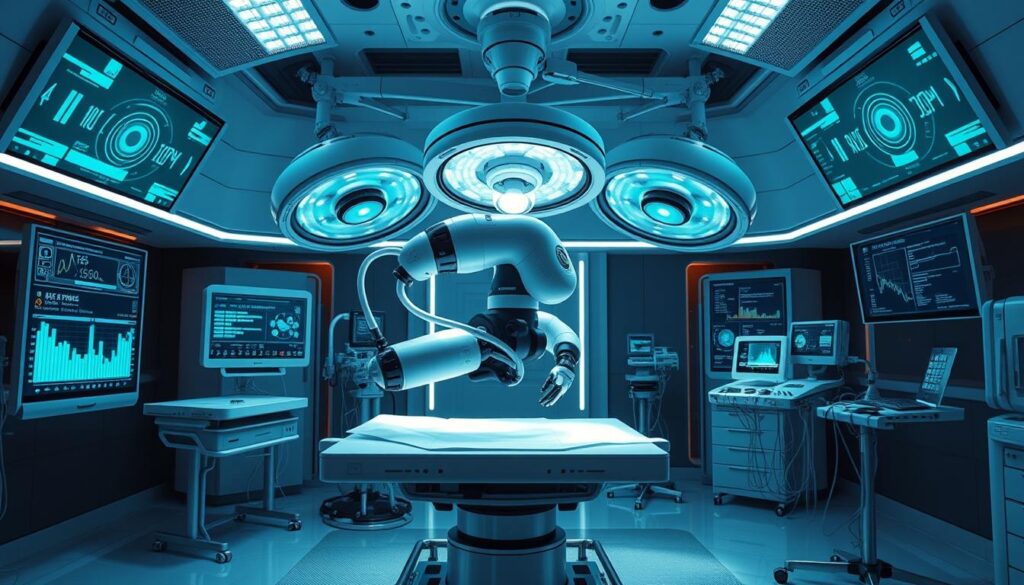
| Metric | Traditional Surgery | Robotic-Assisted Surgery |
|---|---|---|
| Surgical Precision | Standard tools and techniques | High precision with robotic instruments |
| Recovery Time | Longer recovery | Shorter recovery with less pain |
| Complication Rates | Higher risk of complications | Lower risk of infections and complications |
| Patient Satisfaction | Moderate | Higher due to better outcomes |
AI in robotic surgery is part of a bigger trend in healthcare. It’s making things better for patients. The research shows these new methods are becoming more common1314.
AI in Drug Discovery
AI is changing the way we find new medicines. It uses advanced data analysis to make research faster and more efficient. Before, finding a new drug took years and cost a lot. But AI is making this process much quicker and cheaper.
Accelerating Research and Development
AI helps find new treatments by looking at huge amounts of data. It’s expensive and takes a long time to bring a new medicine to market. But AI can predict how proteins might work, which is a big help.
AI uses special models to create and improve new molecules. This means we can make new drugs faster. It’s a big step forward in finding new treatments.
Reducing Time and Costs
AI makes drug trials faster and cheaper. Most cancer drugs fail in trials, but AI can predict how well a drug might work. This means we don’t have to spend as much on animal tests.
AI also helps solve problems in the drug supply chain. In June 2022, 41% of issues were related to supply chain problems. AI could save billions of dollars in the long run.

| Aspect | Traditional Method | AI-Enhanced Method |
|---|---|---|
| Time to Market | Up to 14 years | Reduced significantly |
| Cost of Development | Over $1 billion | Potential savings in billions |
| Clinical Trial Success Rate | 3% success rate | Increased predictive analytics |
| Animal Testing | High reliance | Minimized through AI |
Integrating AI into Electronic Health Records
AI in EHRs is changing how we manage healthcare data. It makes organizing patient info better and lets doctors quickly get to important data. This helps them make better decisions for patient care.
Data Management and Analysis
AI helps spot patterns in healthcare data that we might miss. Studies show AI improves clinical decisions by using EHRs and patient data15. It uses smart algorithms to help doctors improve their work15.
Epic Systems, a big EHR vendor, is adding 100 AI features to help healthcare16.
Improving Patient Privacy and Security
AI also makes us realize how important keeping patient data safe is. There are big risks with AI in EHRs, like data privacy and security16. So, healthcare groups must have strong security to protect against these risks.
Epic is working on an ‘AI Trust and Assurance Suite’ to keep data safe and follow privacy rules17.
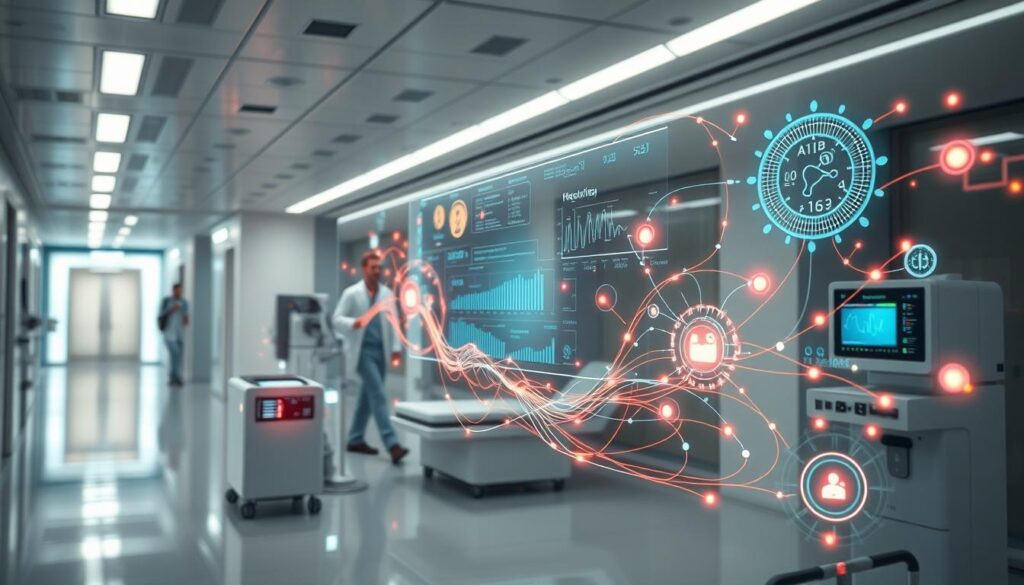
The Role of Wearable Technology
Wearable technology is changing healthcare by allowing constant health checks. This is key for catching problems early and acting fast. With AI wearables, you can easily keep track of important health signs. This helps you stay aware and involved in your health care.
This technology lets you see your heart rate, blood pressure, and more in real time. It helps you manage your health better18.
Continuous Health Monitoring
AI devices keep an eye on your health all the time. They help a lot with chronic conditions like diabetes and heart disease. These conditions are becoming more common, making remote health checks very important18.
These wearables gather important health data. They help you stay ahead of health issues, possibly even before they start19.
AI in Remote Patient Management
AI is key in making remote patient care better. It lets you check your health without always going to the doctor. These technologies make healthcare more efficient and improve the patient experience.
They help create health plans that fit you, thanks to machine learning. AI remote management lets doctors give you care that’s just right for you. This leads to better health results for everyone18.
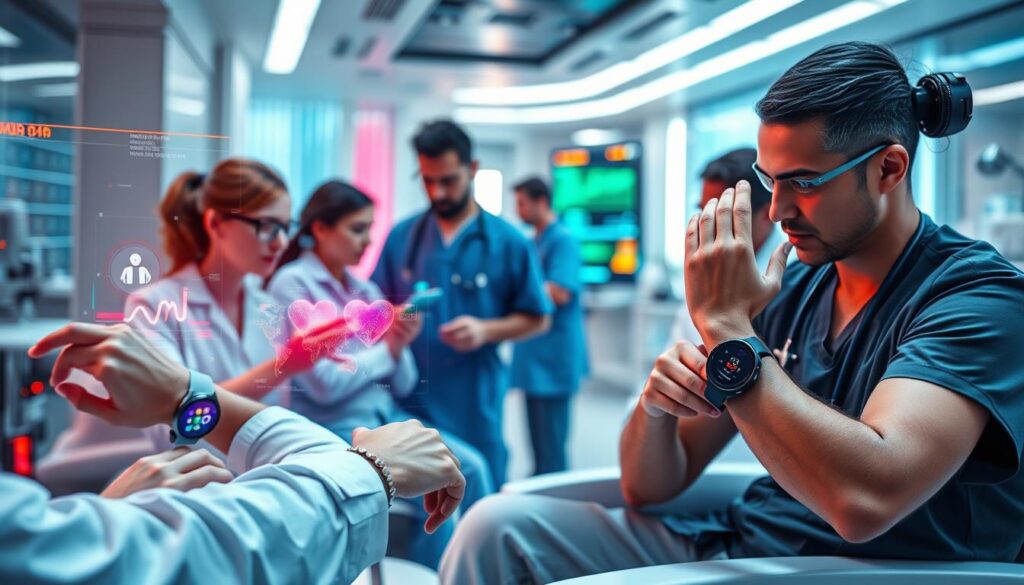
Ethical Considerations in Medical AI
Artificial intelligence (AI) in healthcare raises big ethical questions. It’s important to understand AI data privacy and AI algorithm bias. These issues affect how well and fairly AI works in medicine.
Data Privacy Concerns
AI uses lots of data, leading to big privacy worries. Questions about who owns the data and if people gave consent are key. The European Parliament’s resolution on AI in healthcare highlights the need for action20.
When looking at tools like IBM’s Watson for cancer care, we must think about trust and accountability20.
Bias in AI Algorithms
AI algorithms can be biased, which is a big problem. This bias can come from the data used to train them. For example, studies show that some algorithms may not work well for minority groups or those in need of more medical help21.
These biases make it hard to treat everyone fairly. They also show the need for clear algorithms, diverse data, and working with the community21.
To tackle these AI ethics, we need to be flexible and protect patient safety. The HITRUST AI Assurance program offers a way to handle these issues22. By focusing on ethics, we can make sure AI helps everyone, not just some.
The Future of AI in Healthcare
The future of AI in healthcare is exciting and full of possibilities. It could change how we practice medicine and improve patient care. Experts say new technologies will help with diagnosing, planning treatments, and engaging with patients. But, we must tackle the challenges of using AI to make sure it works well for everyone.
Potential Innovations on the Horizon
Future projects aim to make AI in healthcare even better. The National Academy of Medicine sees AI as a way to better patient care and lower costs. AI has already made big improvements, like quick screenings for kidney disease at the Mayo Clinic23.
AI has also helped find heart problems early, even when people don’t show symptoms23. The World Health Organization (WHO) stresses the need for safe and effective AI in healthcare24.
Challenges to Overcome
Bringing AI into healthcare comes with challenges. One big one is following rules and making sure AI is safe and works well24. There are also worries about AI being unfair or biased23 and24.
The American Medical Association says AI should help doctors, not replace them23. Mike King from IQVIA believes AI can greatly improve healthcare24.
Case Studies: Successful AI Implementations
AI is changing healthcare in big ways. Places like TidalHealth Peninsula Regional, Mayo Clinic, and Valley Medical Center show how AI boosts efficiency and patient care.
Notable Hospitals and Institutions
AI is changing how hospitals work. For example, Mayo Clinic teamed up with Google Cloud to create AI and ML platforms. This has made clinical work better and helped with diagnosis.
Valley Medical Center also saw big changes with AI. It improved how they manage patient use, leading to better results.
Measurable Outcomes and Benefits
AI has brought clear benefits. AI algorithms can be more accurate than humans, with less than 3% error. Humans make about 3.6% mistakes in image analysis25.
AI is also great at diagnosing strokes, cutting down on mistakes seen over decades25. Patients like AI virtual nurses more than traditional nurses, showing tech can improve care25.
To see more of these successes, check out successful AI implementations in healthcare. They’re leading to better care and outcomes for patients.
Conclusion: Embracing AI in Healthcare
In today’s fast-changing healthcare world, adapting to AI is key. Using technology in healthcare is vital for staying ahead. It helps improve patient care and makes operations more efficient.
By using AI tools every day, you can change how care is given. It becomes more tailored and based on data.
The Importance of Adaptation
AI is not just a plus; it’s a must for healthcare. It’s important for you and your team to see the value in AI. It leads to better diagnosis, smoother workflows, and better care for patients.
As you move forward, it’s crucial to think about ethics and data privacy. These are key to gaining trust and making AI work well in healthcare2627.
Looking Ahead in Medical Technology
The future of AI in healthcare looks bright, but it also brings challenges. Working together is key to making AI healthcare work best. As AI gets better, talking about safety, privacy, and care quality is important.
Learn more about AI in healthcare at AI and Healthcare.
FAQ
What is AI in healthcare?
How does AI improve diagnosis accuracy?
In what ways does AI contribute to personalized medicine?
What role does predictive analytics play in healthcare?
How does AI facilitate the drug discovery process?
What ethical concerns are associated with AI in healthcare?
Can AI enhance robotic-assisted surgical procedures?
What are the future prospects for AI in healthcare?
How is AI transforming patient monitoring?
Source Links
- How AI Is Transforming The Future Of Healthcare – https://www.internationalsos.com/magazine/how-ai-is-transforming-the-future-of-healthcare
- Artificial Intelligence (AI) in Healthcare & Medical Field – https://www.foreseemed.com/artificial-intelligence-in-healthcare
- Revolutionizing healthcare: the role of artificial intelligence in clinical practice – BMC Medical Education – https://bmcmededuc.biomedcentral.com/articles/10.1186/s12909-023-04698-z
- Revolutionizing Healthcare: How is AI being Used in the Healthcare Industry? – https://www.lapu.edu/ai-health-care-industry/
- Impact of Artificial Intelligence (AI) Technology in Healthcare Sector: A Critical Evaluation of Both Sides of the Coin – https://pmc.ncbi.nlm.nih.gov/articles/PMC10804900/
- How Artificial Intelligence is Impacting the Health Care Field – https://onlinedegrees.sandiego.edu/ai-healthcare/
- Council Post: What Is The Impact Of Artificial Intelligence On The Healthcare Industry? – https://www.forbes.com/councils/forbesbusinesscouncil/2023/11/06/what-is-the-impact-of-artificial-intelligence-on-the-healthcare-industry/
- How AI Is Improving Diagnostics, Decision-Making and Care | AHA – https://www.aha.org/aha-center-health-innovation-market-scan/2023-05-09-how-ai-improving-diagnostics-decision-making-and-care
- Revolutionizing Patient Care with AI-Driven Diagnostics | Thoughtful – https://www.thoughtful.ai/blog/revolutionizing-patient-care-with-ai-driven-diagnostics
- Artificial Intelligence for Medical Diagnostics—Existing and Future AI Technology! – https://pmc.ncbi.nlm.nih.gov/articles/PMC9955430/
- Natural Language Processing in Healthcare | Consensus – https://www.consensus.com/blog/natural-language-processing-in-healthcare/
- Leveraging Natural Language Processing (NLP) in Healthcare – https://intellias.com/natural-language-processing-nlp-in-healthcare/
- Artificial Intelligence With Robotics in Healthcare: A Narrative Review of Its Viability in India – https://pmc.ncbi.nlm.nih.gov/articles/PMC10287569/
- Clinical applications of artificial intelligence in robotic surgery – https://www.ncbi.nlm.nih.gov/pmc/articles/PMC10907451/
- The role of artificial intelligence for the application of integrating electronic health records and patient-generated data in clinical decision support – https://www.ncbi.nlm.nih.gov/pmc/articles/PMC11141850/
- AI is transforming EHRs, the future of healthcare – https://globaledge.msu.edu/blog/post/57419/ai-is-transforming-ehrs-the-future-of-he
- The Promise of AI in Electronic Health Records is Here – https://guidehouse.com/insights/healthcare/2024/ai-in-ehrs-is-here
- The Emergence of AI-Based Wearable Sensors for Digital Health Technology: A Review – https://pmc.ncbi.nlm.nih.gov/articles/PMC10708748/
- The Emergence of AI-Based Wearable Technology in Healthcare – https://www.ideas2it.com/blogs/how-ai-can-improve-healthcare-and-medicine
- Frontiers | Legal and Ethical Consideration in Artificial Intelligence in Healthcare: Who Takes Responsibility? – https://www.frontiersin.org/journals/surgery/articles/10.3389/fsurg.2022.862322/full
- Health Equity and Ethical Considerations in Using Artificial Intelligence in Public Health and Medicine – https://www.cdc.gov/pcd/issues/2024/24_0245.htm
- The Ethics of AI in Healthcare – https://hitrustalliance.net/blog/the-ethics-of-ai-in-healthcare
- AI in healthcare: The future of patient care and health management – Mayo Clinic Press – https://mcpress.mayoclinic.org/healthy-aging/ai-in-healthcare-the-future-of-patient-care-and-health-management/
- The future of AI in healthcare – https://www.iqvia.com/blogs/2024/02/the-future-of-ai-in-healthcare
- Top 5 Cases for Using AI in the Healthcare Industry – Glorium Technologies – https://gloriumtech.com/top-5-use-cases-for-ai-in-healthcare/
- Embracing the Future: Opportunities and Challenges of AI Integration in Healthcare – ACRP – https://acrpnet.org/2024/02/16/embracing-the-future-opportunities-and-challenges-of-ai-integration-in-healthcare
- The Role of AI in Evolution of Modern Healthcare – https://www.linkedin.com/pulse/role-ai-evolution-modern-healthcare-dr-maulik-vyas-pqntf
